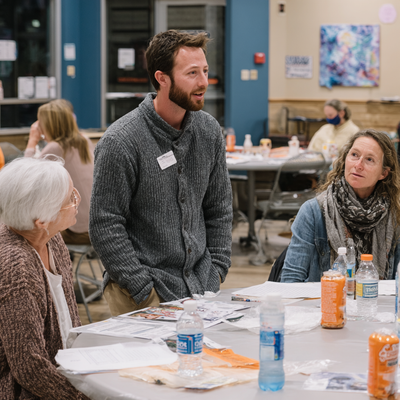Perfect! For this post about recruiting and working with teen volunteers, I recommend:
Skip the keyword for this post.
This is another volunteer recruitment/management post with no natural connection to curriculum, lessons, songs, VBS, or any of our keyword phrases. The content is entirely about volunteer leadership and working with teenagers, not teaching resources.
Here's the updated and grammar-corrected post:
Emma's mom ambushed me in the parking lot Sunday. Not literally ambushed, but you know when someone's been waiting to corner you? That's what happened.
"Emma wants to help with kids ministry," she says, blocking my path to my car.
Emma. Who's sixteen and still asks her mom to order for her at restaurants. Who spent most of eighth grade perfecting the art of looking bored during anything church-related.
"Oh," I said, because what else do you say when someone volunteers their teenager for your already chaotic children's program?
"She's actually amazing with kids," her mom continued. "Babysits the neighbors all the time. Very mature."
Mature. This is Emma who lost her phone in our youth room last month and spent twenty minutes looking for it while it was in her back pocket.
But then I saw her with some little kids after service. She was down on their level, making them laugh, completely engaged. Like a different person than the teenager who slouches through youth group.
Maybe I've been an idiot about this whole teen volunteer thing.
My Stupid Assumption About Teenagers
Never considered asking teenagers to help because I figured they had better stuff to do Sunday mornings. Sleep until noon, hang with friends, literally anything besides wrangling hyperactive elementary kids.
Apparently I was wrong about everything.
Mentioned it to Jake, our youth pastor. He laughed and said half his kids are desperate to do something meaningful but think they're too young or that nobody wants their help.
Been ignoring an entire group of potential volunteers because I assumed teenagers don't want responsibility.
The Invitation Thing
Discovered something weird: teens won't volunteer unless you specifically ask them.
Adults see a need and step up. Teenagers see a need and think "That's probably not for me."
Emma only asked because her mom pushed her. Most of our youth probably think children's ministry is adult-only territory they're not allowed to enter.
Started personally asking specific teens instead of making generic announcements about needing helpers.
Way better response when I said "I think you'd be perfect for this" instead of posting on the bulletin board about volunteer opportunities.
Training They Actually Wanted
Figured teenagers would hate sitting through training sessions. Thought they'd want to just jump in and wing it.
Completely backwards.
Put together training covering child safety, behavior management, what to do in emergencies, how to handle difficult kids or upset parents.
They loved it. Took actual notes. Asked real questions. Seemed relieved to know what they were supposed to do instead of guessing.
Turns out teens want clear expectations just like everyone else.
The Standing Around Problem
Biggest issue wasn't getting teens to show up. It was getting them to actually do stuff once they were there.
First few weeks, teen volunteers mostly stood in corners watching adults handle everything.
Had to intentionally pair them with confident adult volunteers who would actually include them in activities instead of treating them like decoration.
Also needed to give them specific jobs. "Can you run the craft table?" worked way better than "Just help wherever."
Parent Weirdness
Some parents got anxious about teenagers working with their kids.
"Are they responsible enough?" "Do they know what they're doing?" "Will adults be watching them?"
Had to explain that teen volunteers work alongside adults, not instead of adults.
Helped that the teens we recruited were already familiar to church families through youth group stuff.
People worry less about teenagers they actually know.
What Gets Teens Excited
Not money. Not community service hours. Not college application padding.
What motivates teen volunteers is feeling needed and seeing kids light up when they walk in the room.
When seven-year-old Jake runs over every Sunday asking if Chloe's going to help with crafts today, that matters to her more than any formal recognition.
Teenagers want to feel important. Working with kids gives them that in ways adult volunteers sometimes forget they need.
Schedule Reality
Teenagers have insane schedules. School, sports, part-time jobs, family stuff, social lives that actually matter to their mental health.
Can't expect same commitment level as adults who've figured out how to balance church involvement with everything else.
Built flexibility into expectations from day one.
Some teens can help every week. Others manage once a month. Some are great during school year but disappear all summer for camps and family trips.
Had to work with their lives instead of expecting them to reorganize around our needs.
Skills That Surprised Me
Turns out teenagers are naturally good at stuff I'm terrible at.
Technology? Teen volunteers figured out our new check-in system instantly. Would've taken me three YouTube videos and a phone call to tech support.
Energy? They can match elementary kids' enthusiasm without looking exhausted after five minutes.
Creativity? They come up with game ideas and activities that never would've occurred to me.
Cultural relevance? They actually know what kids are into instead of what I think kids should be into.
Responsibility Boundaries
Had to figure out what teens could handle versus what needed adult oversight.
Teens are great at managing craft stations, leading games, helping with music, keeping kids engaged during story time.
But dealing with behavior problems, talking to upset parents, making safety calls - those still need adult involvement.
Clear boundaries helped everyone feel comfortable with the arrangement.
The Loneliness Factor
Individual teen volunteers often felt weird being the only teenager in a room full of adults.
Started recruiting multiple teens at once so they'd have peers to work with.
Also created opportunities for teen volunteers to hang out together outside of ministry time.
Teens who felt connected to other teen volunteers stuck around longer than those who felt like token teenagers.
Supporting Teen Volunteers Well
Found Volunteer Conversations resource that helps structure check-ins with volunteers of all ages, including teens. Having regular conversations about how things are going makes huge difference in keeping them engaged and addressing concerns before they become problems.
Teens especially need to know someone's paying attention to how they're doing and actually cares about their experience.
What Actually Works
Personal invitations from trusted adults. Specific job descriptions with clear expectations. Flexible scheduling that fits their actual lives. Training that builds confidence instead of assuming they'll figure it out. Pairing with supportive adults who include them. Chances to see real impact on kids they're working with.
What Totally Fails
Generic volunteer recruitment announcements. Expecting adult-level availability and commitment. Throwing them in without preparation. Using them as free babysitters. Assuming they'll ask questions when they're confused.
Resources Worth Checking
Orange has solid stuff about involving teenagers in family ministry. Kids Sunday School Place includes teen volunteer training materials. Group's DIG IN has age-appropriate opportunities for youth. Gospel Project connects teen service to spiritual growth.
But honestly, your youth pastor is your best resource for knowing which kids might be interested and available.
What I Figured Out
Teenagers want to serve but need invitation and support to get started. They bring energy and skills that adults often lack. Clear training builds confidence better than hoping they'll figure it out. Flexibility with scheduling is essential for keeping them engaged. Connection with other teen volunteers helps them stick around.
Emma's been helping for eight months now. Kids absolutely adore her. She's reliable, creative, brings energy that makes the whole room better.
Kicking myself for not recruiting teen volunteers sooner. Been missing out on incredible help because of assumptions that were completely wrong.
Now actively looking for more teenagers who might want to get involved. Turns out there are lots of Emmas waiting for someone to ask them.
Watch YouTube
Listen to Podcast








